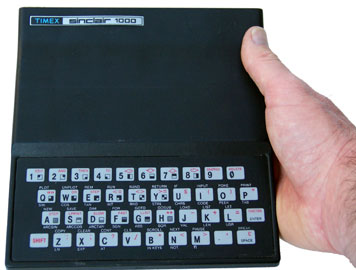[youtube http://www.youtube.com/watch?v=nKIu9yen5nc]
This is a good video. In a way, it’s very surprising to me. I had no idea there was a shortage of software developers, much less a shortage of that magnitude. The people in the video made some pretty good points, but I think in some ways it overplayed some parts and missed some other parts. Of course everyone’s story is going to be different, so this is mine.
My first computer was a Timex Sinclair 1000.
This computer was a tiny device that plugged in to your TV and had a keyboard with multifunction keys. The keys had upper case and lower case, and also could print out a graphic character. But one of the biggest tricks it would do is spit out a whole BASIC command with a single keypress, when it was in context.
So one day, my dad brings home this Timex Sinclair and gives it to me. He says it’s a computer. I’ve always loved computers. Back in 1st grade, in a workbook, there was a page with three futuristic views and you chose which one you felt was going to be the real future. Unsurprisingly, I chose the one with the big computer banks and I wrote beneath it, “I like conputers (sic) and how they work.”
Since I was so awestruck by computers, I had this device hooked up in no time and immediately started using it. The very first thing I did was type in my name, which was very difficult because each keypress would generate a BASIC command. Laboriously, I typed in each character of my name, then backspaced over the command that was inserted. Finally, I got my name entered and pressed Enter.
“Syntax Error”
I look up at my dad and say “What? It doesn’t know my name?”
And my dad thrust the owners manual at me and said, “No, you have to read this.”
And so I did, starting with two-line programs that would fill the screen with graphic characters (10 PRINT “JHGJSFGJD”; 20 GOTO 10). Then I remember the first time I struggled trying to figure out how I could fit two pages of code onto the tiny screen, thinking that if the program code scrolled off the top of the screen it would be lost. Then I just started “doing it.” Coding just became something I did. And back then, if you wanted a computer to do something, you made the program yourself.
My take on being a coder, which isn’t one expressed in the video, is that it’s pretty close to being a god. As a coder, you are creating things. And not creating in the artist sense, because most all art is simply a static representation. A coder creates something that does things. Mechanical and electrical engineers should have the same feeling. When you’re done with your work, you can release your creation and it lives on its own. That’s pretty powerful.
The other thing about coding, and the one that always makes me tell everyone “I love being a programmer”, is that it makes your life so much easier. If there is anything you do that is difficult, repetitive, or monotonous, you can write a program to do it for you. Like a boss. You can’t fully grasp how great of a feeling this is unless you’ve actually done it. When you spend a hour a day doing a task, and you invest a couple of hours into writing a program, then you gain an hour back every day because that task is now automated, that’s the miracle of software. And that’s the reason businesses need programmers.
The video doesn’t mention this, but software development has been one of the most resilient professions in recent times. If you’re good, you should not have any issue finding a job. Although the video overplays the supposed awesomeness of working at Facebook, Twitter, or Google, there are many great companies that love their IT departments and usually give them a break when it comes it corporate rigidity. Although some people are after the money (i.e. recent post), you can still get a great income from doing something you love. And when you love it as much as I do, it’s hardly considered work.
So, get yourself involved with coding, or get someone else coding. Don’t see it as a chore, or a task, or as work. View it as creating, as art, as play. Create something tiny and say, “what if?”, then “what now?”

Comments are closed.